One Indian graduate student shares his advice on studying abroad in the USA Sai N. S., an international Cybersecurity graduate student from Ongole, Andhra Pradesh, India, shares some tips that could help students from India study abroad at Rowan University.
Author: Adeline McDonald
Men’s Hockey Captain on Leadership Journey
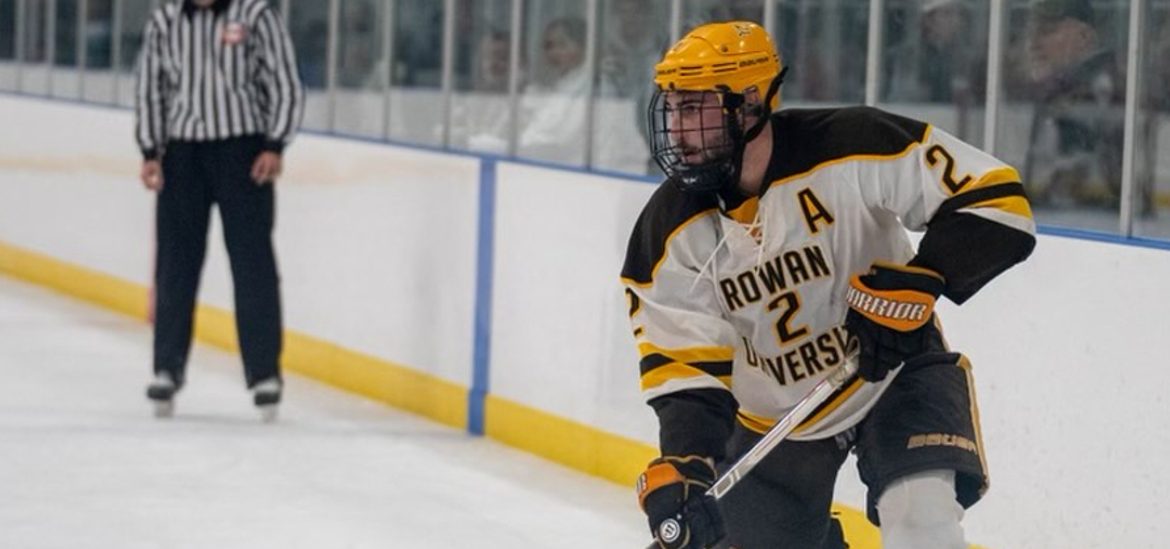
Not many have the privilege of playing collegiate sports; fewer have the chance to earn the title of captain. A recent graduate of Rowan’s finance program, Jared C. of Wayne, NJ (Passaic County) wore the “C” after holding down the blue line for Rowan’s Men’s Hockey team for three seasons (2019-2020, 2021-2022, 2022-2023). Wearing a […]
Water and Oil, A Writing Arts Major’s Short Story

In honor of National Book Month we feature this short story, an original work by an aspiring student author at Rowan University Nina P, a sophomore writing arts major with a minor in romance from Marlton, NJ (Burlington County), shares her passion for writing with us by creating a short story featuring a sapphic relationship […]
Alumnus Launches Spectrum Sports for Special Needs Athletes

A glimpse into a former special education teacher’s career pivot After graduating and launching his special education career in 2011 and teaching for 10 years, alumnus Dan M. noticed a gap in available recreation and athletic opportunities for people who are a part of the special needs community. To fill the gap and serve the […]
Parents Share Perspectives on Checking College Grades

The Grown & Flown series features wisdom and insight from parents of current Rowan Profs, to help parents of new Rowan Profs. The transition of parenting a child at home to parenting a young adult at college is an important one, and Rowan parents are here to help our community. Read additional stories here. What […]
My Home Away from Home, The United Latino Association
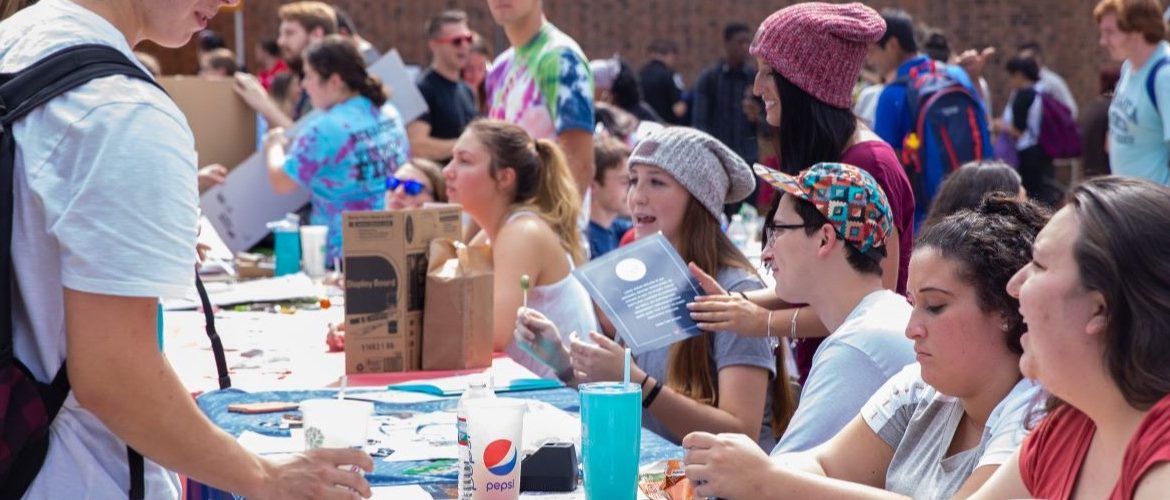
Julianna W, reflecting on her sophomore year as a political science major from Oak Ridge, NJ (Passaic/Morris Counties), shares this first-person perspective on how joining the The United Latino Association at Rowan University helped her rewrite her experience and find a home away from home. In addition to her major, Julianna will earn certificates of […]
Neurodiversity Advocate Promotes Autism Awareness at Rowan

One Rowan University Student Breaks Down Barriers All Year Round, Not Just During Awareness Months In 1997, sociologist Judy Singer introduced a new terminology to the world of science/medical world called neurodiversity, which is a concept that helps those to understand that there are varied ways that each person’s brain processes information, functions, and presents […]
Transitioning From Living on a Farm to a City

One Rowan University Student Shares Her Journey Through Culture Shock Hannah G, a senior business management major from Hammonton, NJ (Atlantic County) shares this first-person perspective on how her life changed when moving from a farm to a city.
Change is Good (Even When It’s Your Major)

One Student Shares How She Found Her True Path by Changing Her Major at Rowan University Meghan T, a senior advertising and public relations double major from West Caldwell, NJ (Essex County) shares her personal journey of self-discovery, leaving her childhood dream behind and embracing a newfound passion. Miss T, a dream I had since […]
My Favorite Places to Eat at Rowan University
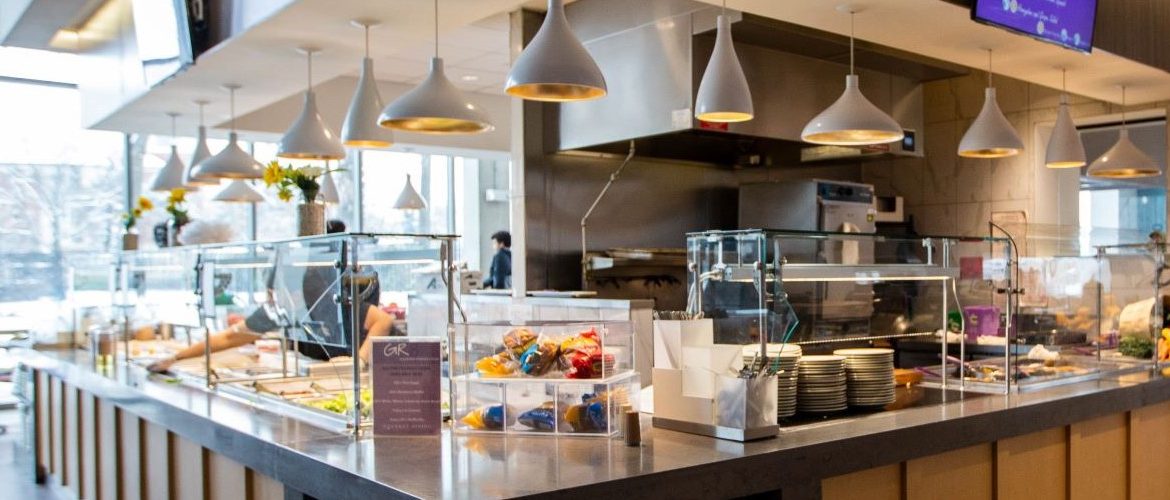
Two On Campus Residents Share Insight on Food at Rowan From a student on campus in 2026 to a student who shared their experience in 2023, two Rowan Profs share their personal opinions about the best dining spots on the Rowan University Glassboro campus. 2026: Ignacio’s Version Ignacio D., a sophomore mechanical engineering major and […]
From Community College to a 4-Year University Experience

Kaleigh B, a senior communication studies major from Washington Township (Gloucester County) shares this first-person perspective on their experience transitioning from Rowan College of South Jersey to Rowan University. Like what you see? LEARN MORE Written by Kaleigh B, a communication studies major Story edited by Valentina Giannattasio, a rising junior dance and marketing double major
Surviving Rowan as an Extroverted Introvert

Laney M, a junior advertising major from Mickleton, NJ (Gloucester County) shares this first-person perspective on their experience being an extroverted-introvert, and how college helped them defeat their fears. Written by: Laney M, Junior advertising major Story edited by: Valentina Giannattasio, junior dance and marketing double major
Finding Home at Rowan Through the Student Organization Fair

Nicholas W, a junior health science communication and communication studies double major, from Gloucester County, NJ shares this first-person perspective on how he found a home away from home on Rowan campus.
International Student Shares MIS Major Journey

Osvaldo R, an international student from the Dominican Republic, gives his insight on Rowan’s international program and his experience as a management information systems major. Osvaldo R, originally from the Dominican Republic, is a senior management information systems major with a minor in business analytics and a certificate in cybersecurity. He originally moved to America […]
My First Day At Rowan University, Move In

Lucy M, a sophomore public relations major from Voorhees, NJ (Camden County) shares this first-person perspective on their move-in day as a first-year student last year. Welcome back, Profs, we hope you’re kicking off the year great!
Transfer Student Bonnie’s Study Abroad Adventure in Colombia

Bonnie W, a senior international studies major from Downe Township, NJ (Cumberland County) shares her personal experience with us about the study abroad program she is participating in.
Meet Rowan’s Class of 2027: Goals, Dreams & Passions

With Rowan celebrating its centennial year, we hear from several incoming first year students who share their stories, interests, and goals for their upcoming years at Rowan University.
Students are eager to step foot on Rowan’s campus and are looking forward to meeting new friends, all while making memories that will last a lifetime. They can’t wait to be more independent and start a new path toward their future goals, and gain new experiences throughout their college years. Most freshmen anxiously await networking in college and being introduced to people in their field of study that may provide them with new opportunities down the road. For most of them, college means a change in scenery that provides a better environment to help them succeed academically. One of the most exciting things about college is that students can dedicate their time to learning about something they are truly passionate about, while also having the opportunity to get involved in clubs, sports, and other events that Rowan offers.

Committing to college is not an easy task, and a big decision for most. Some incoming freshmen stated that they choose Rowan because it has a beautiful and colorful campus that provides a welcoming atmosphere. As one student mentioned, “Everyone I met seems to genuinely care about your future success as a person.” Rowan also offers a diverse and friendly environment for all of its students and faculty. Students have also pointed out that even though Rowan is a large school with lots of options, it’s very personal, with small class sizes and committed faculty and staff. Not only that but Rowan’s broad offerings of activities, clubs, sports, events, etc were also aspects that encouraged incoming freshmen to commit to Rowan.

Getting involved around campus is a huge part of the college experience many students look for. Many freshman students are excited to join different sports such as swimming, softball, volleyball, weight lifting, track, football, and basketball, among many other teams. Others are looking forward to joining a wide range of clubs, like the marching band, gaming, art, business clubs, etc.

Some advice that Fall 2023 incoming students would give to high school seniors:
- “Choose wisely and follow your heart.” (Fran Lacap)
- “Do not give up yet. We didn’t come all this way from kindergarten to senior just to drop out, we are almost there. Have patience.” (Adjoa)
- “Make sure to decide on a college that you can see yourself at and has potential for your career.” (Emily Andryca)
- “Do research before deciding where you want to go, your top schools may change.” (Aidyn C)
- “Go where you feel most comfortable, and even if you think you make the wrong choice, you still have the time to fix it.” (Jordan Violante)
- “Follow your heart, not the trend, not figures.” (Chimnecherem Obiadazie)
- “Write out a pros and cons list. This really helped me ultimately decide what is the best choice for me!” (Hailey Sacco)
Like what you see?
Written by: Valentina Giannattasio, junior dance and marketing double major
Behind the Lens: Our Favorite Summer Shots

Internship & Experiential Learning Stories Learn how Rowan Profs go Beyond the Classroom to grow professionally, as well as personally, through internships and other experiential learning. Experiential learning includes hands-on learning opportunities provided through research, student clubs, campus leadership, student worker jobs, service-learning projects and volunteerism. In addition, Rowan’s Office of Career & Professional Development provides career support that’s more than just […]
Finishing His College Career Strong With a Summer Class

Today, we meet Jonathan P, a senior biological sciences major from Williamstown, NJ (Gloucester County), here to talk about his experience with taking summer classes at Rowan and how it’s been beneficial to him. Jonathan enrolled in Intro to Biochemistry this summer at Rowan. As it relates to his experiences in the class, Jonathan […]
Advice from a Mom of a Senior for First-Time College Parents

The Grown & Flown series features wisdom and insight from parents of current Rowan Profs, to help parents of new Rowan Profs. The transition of parenting a child at home to parenting a young adult at college is an important one, and Rowan parents are here to help our community. Read additional stories here. Kim […]
Building Stronger Connections Through Rowan’s Summer Classes

Today, we meet Richard R, a senior biological sciences major on a pre-vet track, from Burlington, NJ (Burlington County), here to talk about his experience with taking summer classes at Rowan and how it’s been beneficial to him. This summer Richard completed Organic Chemistry, Physics II, (both online) and Plant Diversity (in person) summer […]
Finance & MIS Major Interns at Campbell’s Soup Co.

A glimpse into hands-on learning for a finance and management information systems major Landon N, a senior double major in management information systems and finance from Mullica Hill, NJ (Gloucester County), gives some insight into his experience taking summer classes at Rowan and his summer internship at Campbell’s Soup Company. Landon wrapped up two online […]
Grown & Flown: Moving Away & Fostering Independence

The Grown & Flown series features wisdom and insight from parents of current Rowan Profs, to help parents of new Rowan Profs. The transition of parenting a child at home to parenting a young adult at college is an important one, and Rowan parents are here to help our community. Read additional stories here. Today […]
Keeping a Healthy Mind & Body at Rowan University

Nicholas P, a junior sports communication & media major, from Hopewell, NJ (Mercer County) shares this first-person perspective on the importance of keeping your mind and body active and healthy. He proceeds to explain how Rowan resources help him feel comfortable and build bonds on campus. Like what you see?
Master in Teaching Grad Reflects on Her Journey

Today we feature Master in Teaching graduate student Madelyn O. from Washington Township, NJ (Gloucester County) who recently completed her studies. Madelyn pursued her master’s degree immediately following her undergraduate studies. What’s been the defining points of your academic career here, anything at all that stands out to you in particular? Well, my academics, like […]
How Joining Choir Transformed My College Experience

Alaina L., a junior music and advertising double major from Swedesboro, NJ (Gloucester County) shares this first-person perspective on how joining Rowan Choir helped her rediscover her passion for music, improve her academic performance and feel a sense of belonging on campus. Written by: Alaina L, junior music and advertising double major Story edited by: Valentina […]
Finding Identity & Pride at Rowan: Kayden’s Journey

Today, we feature Kayden H. (he/his), a rising junior Writing Arts major. We strive to amplify all student voices, all year-round. To be featured, please contact rowanblog [at] rowan.edu. Kayden discusses how Rowan has helped him to find his new sense of identity and community amongst those on campus. He also goes into how we […]
Parent Tips: Supporting Students Through Tough Times

The Grown & Flown series features wisdom and insight from parents of current Rowan Profs, to help parents of new Rowan Profs. The transition of parenting a child at home to parenting a young adult at college is an important one, and Rowan parents are here to help our community. Read additional stories. How did […]
Finding Strength Through a Professor’s Compassion

Starr B, a rising advertising major from Vineland, NJ (Cumberland County) shares this deeply personal first-person perspective on how a Rowan professor went above and beyond to help her face a challenging time in her life. Due to the subject matter, the editors have chosen to include campus photos instead of people photos in this […]
Why Radio/Film? A Global Student’s Perspective

Eren B. is a sophomore student here at Rowan University majoring in Radio, Television, and Film. Eren is from Istanbul, Turkey, and first heard about Rowan University through his cousin who graduated from Rowan a few years ago. After discovering that at Rowan he could pursue his dream of furthering his education in film and […]
Top 14 Must-Have Dorm Essentials for First-Year Students
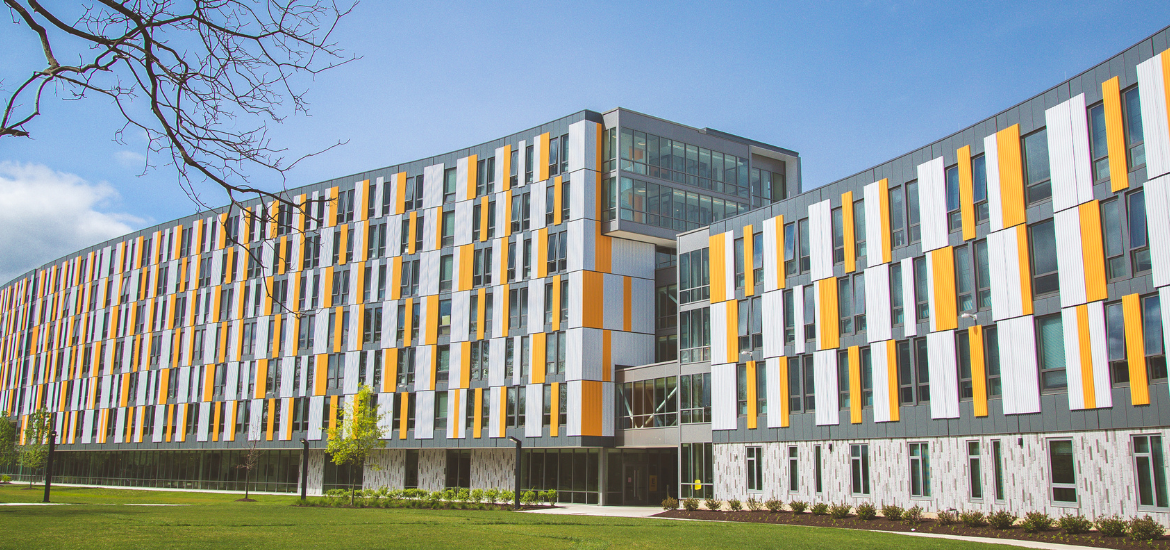
As the last beach breezes begin to blow, college move-in creeps up closer and closer. Many students are returning to their own stomping grounds here at Rowan University. However, much of the student body comprises first-year students heading into the unknown as they begin their higher education careers. Outside of books and other stationery, there […]
Sports Communication & Media Major’s Path to the Big Leagues

Coby O. a sports communication and media major from Toms River, NJ (Ocean County) who will graduate this fall, details his incredible experience as a social media coordinator for Major League Baseball. As a sports communication and media major (Sports CAM), Coby hones interests that span the fields of radio, television and film (RTF) production, […]
Paleoart, Not Just For STEM Majors [VIDEO]

Thomas B, a rising senior radio TV film major, talks about his experiences in paleoart and the unique combination of concepts and experiences that the field entails. This past semester Thomas took the geology lab science class Breathing Life Into Fossils: The Science of Paleoart (GEOL 01.313). While it may seem surprising that a student […]
RTF Grad Christianna A Premieres First Feature Film

With a deep desire to break the mold and the stereotype that filmmakers need to move to the West Coast for their work, young Rowan alum Christianna A. achieved her dream within two years of graduation. A 2021 graduate of Radio, Television, and Film, with a minor in Creative Writing, Christianna’s feature film “Paper Gems” […]
Kate K. on Studying Construction Management

Kate K, a construction management graduate student who works in the industry, shares her story and how Rowan helped her in her career. Kate K. is a graduate student in the construction management program. She is currently working with Churchill Construction Engineers, where she helps supervise construction projects, works with inspectors to ensure they have […]
Full-Time Student & Army National Guard: Balancing Both

Nicholas W., a rising junior advertising major from Mercer County, NJ shares this first-person perspective on his life as a full-time student who is in the Army National Guard. My name is Nicholas W and I am a full time student here at Rowan University. While being a full time student I am also In […]
CHAMP & EOF Alumna Dr. Chaliyah Penick’s Acupuncture Journey

Chaliyah Penick, a graduate from the class of 2010, shares insights on her career in acupuncture and how her Rowan experience helped propel her into her field. Dr. Chaliyah Penick graduated from Rowan in 2010 with a bachelor’s degree in sociology. From that foundation, she built her career path in a different direction. She entered […]
Meet Incoming Transfer Students Joining Rowan University

Today we’re excited to feature more incoming transfer Rowan Profs. Ella H. will transfer from Rowan College at Burlington County; Tanisha S. will transfer in from Stockton University; and Leah D. is joining us from Camden County College. Welcome to Rowan! Could you share with us one thing you are looking forward to at Rowan […]
Student-Athlete Shares Advice on Balance and Planning

Marquise Young, a rising senior advertising major from Camden, NJ (Camden County) shares tips about being a student athlete. For about 90% of my life I’ve been in school in some kind of way and playing some kind of sports, whether it’s for my school or for a club team. I’ve also been told since […]
How I Parent My College Student: SGA Mom Shares

Today we hear from Lori B., a Rowan mom from Gloucester County, NJ. Lori’s daughter Paige will enter her senior year this fall as a supply chain and logistics major through the Rohrer College of Business, and holds the distinction of being a past president of Student Government Association (SGA). As an experienced Rowan parent, […]
Veterinary Breakthrough Helps the Goat

An interdisciplinary, collaborative space, Studio 231 within the School of Innovation & Entrepreneurship helps to bring the best ideas to life – including, this time, giving a new lease on life to a baby goat who was unable to walk. The story of Fortunato the goat highlights the ingenuity – not to mention the impact […]
Community Garden Grows Food and Fosters Inclusion

When you see a garden bursting with beautiful flowers and fresh produce, many stand to admire and indulge in the product. However, while eating these foods, commonly you don’t see the face that nourished these plants before they came into your possession. Mariana C. is one of the faces behind the seeds. A master’s student […]
Explore Rowan’s New Master in Public Policy Program

Rowan University recently launched a new Master in Public Policy program. Professor Elaine Zundl is one of the professors involved in creating the program and shares with us what students can expect. How did you become involved with the creation of this program? My colleagues, including Dr. Lawrence Markowitz, Dr. Katharine Javian, and Dr. Danielle […]
Undergrad Life: Raymond W. Jr Builds Community

Rising senior Raymond W. Jr. (he/him/his) from Gloucester County, NJ, is a subject-matter history major and double minor in both international studies and political science, and he’s also heavily involved with the inner workings of campus as a leader of change. Today he will share with us his personal journey and contributions to the University […]
Welcoming Two Raritan Valley Community College Transfers

Meet our newest transfer Profs Shannon R. and Angelina Z. Both Shannon and Angelina recently graduated from Raritan Valley Community College and will begin at Rowan University this fall. Could you share with us one thing you are looking forward to at Rowan University? Shannon R: I am looking forward to being on my own […]
Studio Art Grad Paige Buza Thrives as Tattoo Artist [VIDEO]

Today we feature Paige Buza, a 2019 graduate from Pennsville, NJ (Salem County) who earned her degree in Studio Art. Here, Paige tells us about her journey to becoming a tattoo artist, how her passion for art stemmed, and how Rowan prepared her for her profession. Browse Paige’s work on Instagram or visit her at […]
Next Stop: Becoming a People Person Post-COVID

Connor B., a rising senior communication studies major from Piscataway, NJ (Middlesex County) shares this first-person perspective on how being an admissions ambassador helped him step out of his comfort zone after COVID-19. In March 2020, and for the seemingly blurry amount of time after, the world was in a constant state of suspense, fear, […]
Fashion Marketing Study Abroad Student Experience

Today we feature Mark B., a senior English major from Vernon, NJ (Sussex County) who will continue his studies as a graduate student this fall after he earned his bachelor’s degree this month. This story is the second of a three-part series where Mark will be featured based on his activities and campus involvement. Part […]
#PROFspective: Arianna G.’s Campus Journey
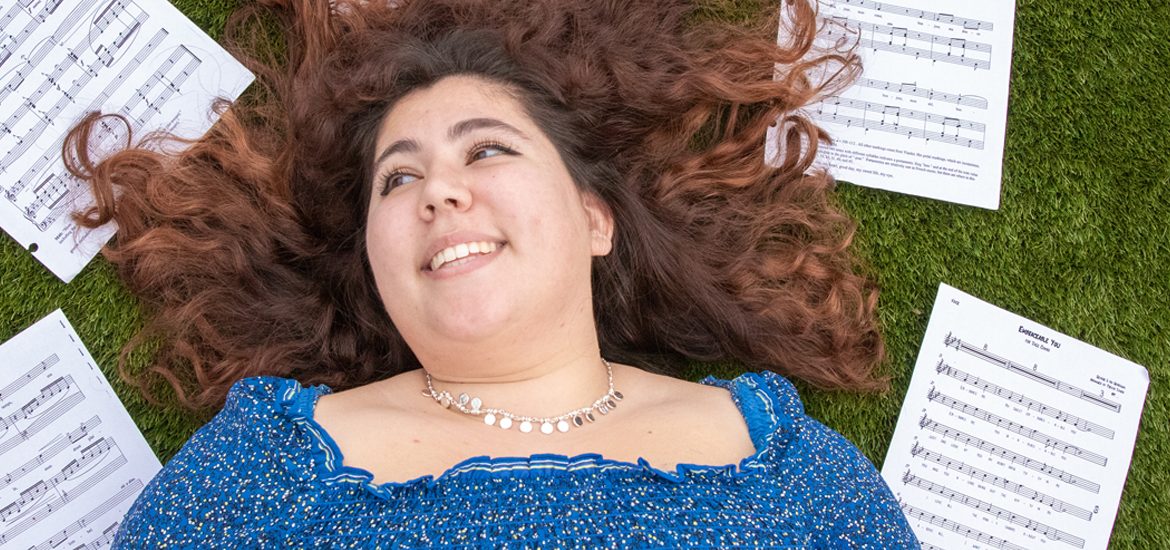
Today we feature Arianna G. from Morris County, NJ. She is a rising senior studying Music Education with a vocal concentration and pursuing a CUGS in Jazz Performance. She currently serves as the president of both Rowan’s NAfME (National Association for Music Education) chapter and Profecy A Cappella group, as well as a leader of […]
Mechanical Engineering Honors Student Balances Sports

Today we feature graduating senior mechanical engineering major and student-athlete Abby H. from Williamstown, NJ (Gloucester County). Abby shares her experience while being an engineering major, a John H. Martinson Honors College scholar, and a member of Rowan’s Field Hockey Team and how she navigates academic workload with her involvement in collegiate athletics. What is […]
Connor S. From Student to Political Operative

A proud graduate from both the Political Science and Communication Studies departments, Connor S.’s segue from student to professional illustrates the impact of leveraging classroom learning, internships and networking to successfully launch a career. As a young grad from the local Gloucester County, NJ, area, having graduated four years ago, Connor’s story shows how “local […]
Caffeine Consumption in College Students

This article is part of a running series with Rowan University’s Wellness Center This collaboration aims to educate students about personal well-being options. For further updates, follow @RowanUWellness on Twitter, Instagram or Facebook. Caffeine seems to have become an inseparable part of being a college student. The most common ways to consume it are through coffee, […]
Reflecting On My Student Teaching Internship Experience

Known for its education programs, Rowan University student teacher shares his perspective In this first-person perspective piece, graduate student in Education, Lucas T. of Gloucester County, NJ, discusses the arduous trials of being a part of something bigger than higher education – being a part of a teaching internship. Throughout his experience as a student […]
Graduate Student Sarah S. Shares Advice For Future Engineering Majors

Today we feature graduate student Sarah S. from Galloway, NJ (Atlantic County), who earned her Rowan bachelor’s in chemical engineering and is continuing her time with a master’s in chemical engineering. She shares her advice for incoming engineering students. Learn more about Sarah’s research. How did you discover that engineering was right for you? So […]
Senior’s Path to a Career in Higher Education

Today we feature Mark B (he/him), a senior English major from Vernon, NJ (Sussex County) who will continue his studies as a graduate student after he earns his bachelor’s degree this spring. This story is the first of a three-part series where Mark will be featured based on his activities and campus involvement. Part 1 […]
Redefining Beauty: It’s Time to Normalize Body Image

This article is part of a running series with Rowan University’s Wellness Center. This collaboration aims to educate students about personal well-being options. For further updates, follow @RowanUWellness on Twitter, Instagram or Facebook. Body image deals with how an individual perceives themselves, how they think about themselves as well as how to view themselves when looking directly […]
How John M. Found a New Home Nearby

From across the street to across the goal line, John M.’s journey from Glassboro High School to Rowan University proves that a great college experience might be in one’s own backyard. “I definitely think that Glassboro High School students overlook Rowan just because it’s across the street,” says John, but his own Rowan experience has […]
Inside the Mind of a Art Education Major: A Q&A

Originally from Lake Wales, located in Central Florida, Gabrielle K. is an upperclassman, on track to earn her Bachelor’s of Fine Arts in Studio Art as an Art Education major here at Rowan University. Are you taking art classes and education classes? Can you tell me a little bit about the classes that you get […]
Senior Reflects on Finding Himself at Rowan

When senior Danny R. a Sports Communication and Media major with concentrations in Sports Journalism and Radio Television & Film Sports Production, with a minor in Marketing, was considering colleges, he wasn’t quite sure what he wanted to do. The Woodbury, NJ (Gloucester County) native shares, “I chose Rowan because of the close proximity to […]
How Jonathan D’s Jersey City Roots Shaped His Dream to Teach

In this edition of #PROFspective, we discuss with Jonathan D., an elementary education major, his intrinsic desire to go into education as well as the different motivations that have fueled him to go into the schooling system. Jonathan, a sophomore from Jersey City, NJ (Hudson County) also serves as marketing coordinator for Rowan After Hours […]
World Ninja League Founder Levels Up His Skills
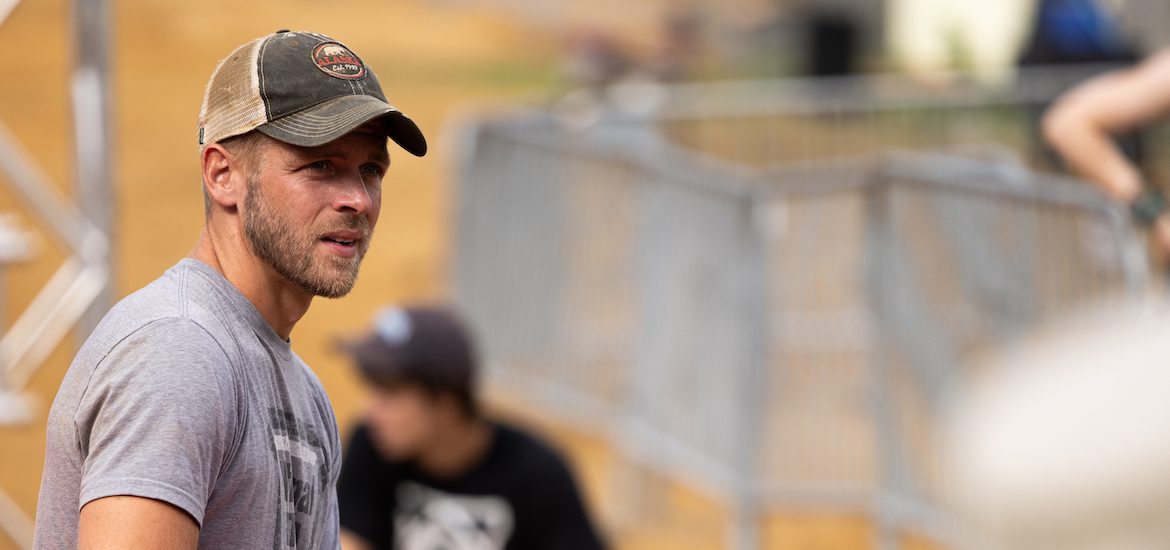
Editor reviewed & updated October 2025. Chris Wilczewski is a Rowan University 2015 alumnus who majored in marketing. Chris is the founder and chief operating officer for the World Ninja League, “home of the world’s leading obstacle course organization.” He discusses how he founded the company, his involvement in ninja competitions, his origin story and […]
Jade Kenny’s Internship Journey with Subaru

Why was Rowan right for you? Jade explains when she was applying to Rowan, her original path drew her to elementary education. For Jade, choosing Rowan was the best of both worlds since it allowed her to study what she believed to be her passion at the time while respecting her parents’ wishes for her […]
Humans of Rowan: Finding Her Place in Wrestling, Volunteerism & Student Leadership

Internship & Experiential Learning Stories Learn how Rowan Profs go Beyond the Classroom to grow professionally, as well as personally, through internships and other experiential learning. Experiential learning includes hands-on learning opportunities provided through research, student clubs, campus leadership, student worker jobs, service-learning projects and volunteerism. In addition, Rowan’s Office of Career & Professional Development provides career support that’s more than just […]
A Closer Look At PULLA Tracker and its Founder Siena Rampulla

Siena Rampulla is a senior student here at Rowan University, originally from Holmdel, NJ (Monmouth County). Siena is a Psychology major, with an honors concentration and a minor in Journalism. When asked to share more about her major, Siena explained she originally planned to go on the pre-med track, which was a long-term dream of […]
Why Self-Advocacy Matters in College (And How to Practice It)

Part of a series with Rowan University’s Wellness Center, this collaboration aims to educate students about personal well-being options. For further updates, follow @rowanuwellness on social. More times than not, whenever we’re experiencing a personal hardship of some kind we tend to retreat into our shells like a turtle and let the issue continue to persist […]
Second-Generation Rowan Engineering Student Lives Her Legacy

September 1996: long before Abigail Cassino was even a thought in her parents’ minds, the foundation was laid for her future legacy. Her parents, Theresa (Gouker) and Chris, met as first-year students at Rowan, part of the first engineering class. Theresa lived in Evergreen Hall; Chris in Mimosa Hall. They met, fell in love, studied […]
Overcoming Overthinking: Ways Students Can Cope

Part of a series with Rowan University’s Wellness Center, this collaboration aims to educate students about personal well-being options. For further updates, follow @rowanuwellness on social. Do you ever find yourself in a quiet setting trying to get some work done but there is just a little voice in your head saying a million things at […]
Jasmine Hull’s Journey to Improving Healthcare
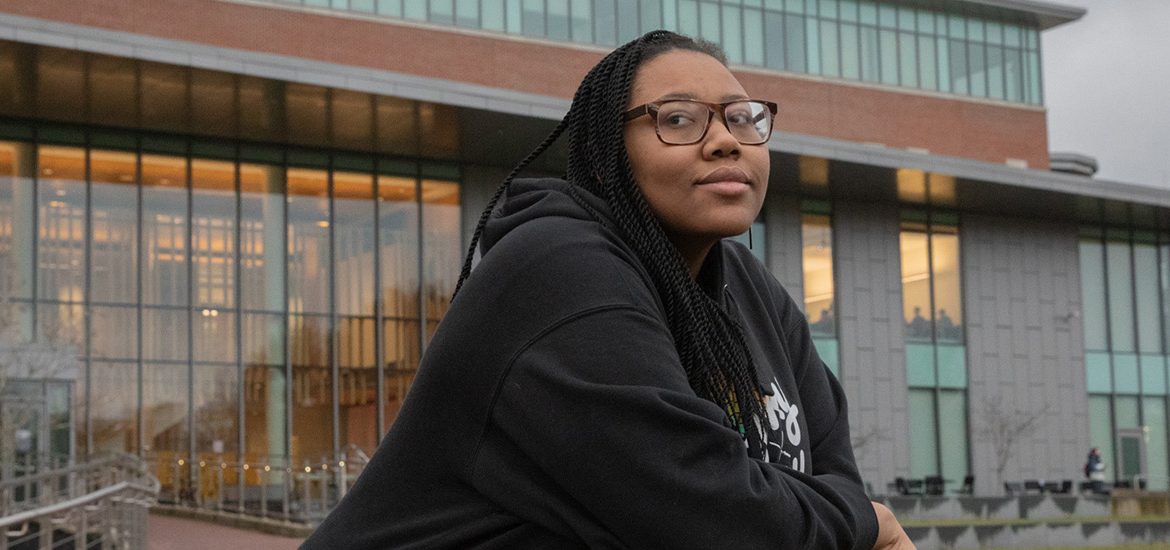
Today we feature senior Public Health and Wellness major Jasmine Hull (she/her) from Mercer County, NJ. Jasmine is living on-campus after transferring to Rowan from Stockton and is a first-generation college student. Here, she gives us some insights into her major and favorite experiences at Rowan. Why did you choose Rowan? Larger sum of transfer […]
How to Build Healthy Friendships As a College Student
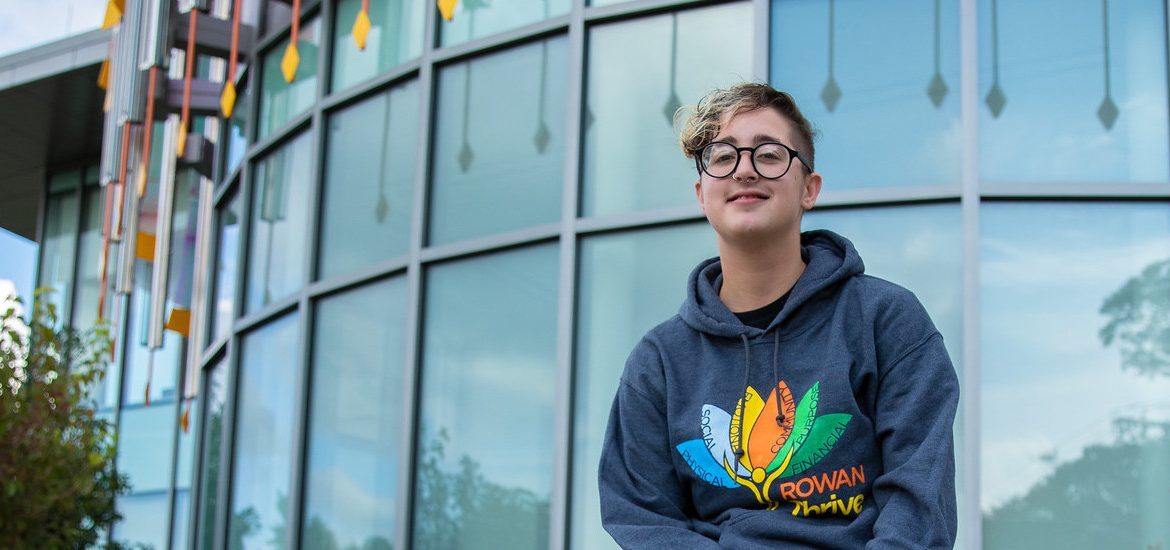
Part of a series with Rowan University’s Wellness Center, this collaboration aims to educate students about personal well-being options. For further updates, follow @rowanuwellness on social. Written by Wellness Center intern Kye Binik, law & justice studies major Friendships in adulthood can be difficult to navigate especially when it comes to recognizing a healthy friendship versus […]
From High School to Showbiz and Back Again: Rowan Alum Janine Edmonds Tells All on Her Career as a Guidance Counselor

Today we feature Janine Edmonds, a graduate of Rowan University’s class of 2001 with a degree in Radio/Television/Film and a 2006 graduate of Rowan’s M.A. In Counseling Educational Settings program. Here, Edmonds tells us about her path returning to higher education and her experience as a guidance counselor for Oakcrest High School. Did You Always […]
Be Prepared for the Unexpected: Rowan University’s Wilderness First Responder Course

Today we take you outdoors with the Wilderness First Responder class, led by Dr. Shari Willis, within the School of Nursing & Health Professions. In a simulated training sequence for the Rowan University course Wilderness First Responder, a wooded area on campus serves as an isolated, high-altitude patch of the Colorado mountains. Here, students must […]
Fadi Khan Talks About New Beginnings

Today we feature student leader Fadi Khan (he/him) of Pleasantville, NJ (Atlantic County). Fadi is a senior Biological Sciences major and lives on campus in Holly Pointe Commons, where he is also a Community Assistant. A first-generation college student, Fadi shares with us his perspectives on life, his major, and getting the most out of […]
Chem E Major Shares: Challenging the World for a Sustainable Future Through Material Science

Rowan Global graduate student Sarah Salazar is completing a master’s degree in chemical engineering, working with others to challenge the future of plastic. “Chemical engineering really is everything. Everything that we touch in our lives has been impacted in some way by a chemical engineer,” Sarah says. “What I love about it is that here […]
Why Rowan is My Home Away from Home

Rowan has also provided me with my first job opportunity. Here I learned how to develop my skills and techniques at the time of taking and editing photos as well as how to communicate openly with different students. As a photographer for Rowan Enrollment Management and Marketing Team, I have been able to work with […]
- Alumni
- ...
Alumni Shaun Pierson ’19: MFA Candidate at Yale

Shaun Pierson (he/him) is a Rowan University 2019 graduate who majored in Radio/TV/Film. He currently lives in New Haven, Connecticut, but during his time at Rowan, lived on campus as an RA. His work has been featured at the Midwest Center for Photography, the Southern Alleghenies Museum of Art, the Foley Gallery (NYC), Vogue Italia, […]
Benjamin Busler: Rowan Engineering Major Interns at NASA

Electrical and Computer Engineering major Benjamin Busler is representing Rowan University this semester as a Pathways Intern with NASA’s Goddard Space Flight Center in Maryland. Benjamin, a junior from Somerset County, is among a select group of students nationwide in NASA’s Pathways program, which offers internships and a direct avenue to future employment with the […]
PROFspective: Kristiina Castagnola on Athletics and Graduate Assistantship

Today we feature Rowan Global graduate student and student athlete Kristiina Castagnola (she/her) from Voorhees, NJ (Camden County). Off the field, Kristiina is a commuter studying for an MA in Higher Education and works as a graduate assistant for the College of Education. On the field, she has become one of Rowan’s most decorated student […]
First Year Voices: Finding My Place at Rowan University as a Music Education Major [VIDEO]

Today, we introduce you to Aaliyah Jenkins of Mercer County, NJ. Aaliyah, a first-year student, studies Music Education and lives on campus. Could you share a few on-campus activities, clubs, sports or events that you’ve attended so far? What was your favorite, and why? There are many on-campus activities to do. This is because of […]
Senior Adrianna Blake Speaks Out

Internship & Experiential Learning Stories Learn how Rowan Profs go Beyond the Classroom to grow professionally, as well as personally, through internships and other experiential learning. Experiential learning includes hands-on learning opportunities provided through research, student clubs, campus leadership, student worker jobs, service-learning projects and volunteerism. In addition, Rowan’s Office of Career & Professional Development provides career support that’s more than just […]
Q&A With a Health & Science Communication Major

Sedrick Golden is a junior student here at Rowan University originally from Pleasantville, NJ (Atlantic County). Sedrick is a Health and Science Communication major with a minor in Public Health & Wellness. Sedrick is breaking down barriers as a first-generation college student commuting to Rowan after transferring from Atlantic Cape Community College. On campus, he […]
How Lanasia Melvins is Making the Most of Her First Year as a Marketing Major

Meet Lanasia Melvins, a first-year student in the Marketing program within the Rohrer College of Business. Lanasia is an on-campus resident from Camden County, NJ. Could you share a few on-campus activities, clubs, sports or events that you’ve attended so far? What was your favorite, and why? I’ve attended Meet the Greeks, Rohrer Fest, and […]
#PROFspective: Civil Engineering Student and Clubs Enthusiast Kayla King

Internship & Experiential Learning Stories Learn how Rowan Profs go Beyond the Classroom to grow professionally, as well as personally, through internships and other experiential learning. Experiential learning includes hands-on learning opportunities provided through research, student clubs, campus leadership, student worker jobs, service-learning projects and volunteerism. In addition, Rowan’s Office of Career & Professional Development provides career support that’s more than just […]
How Law and Justice Major Keshawn Porter Stepped out of His Comfort Zone

Today we feature Keshawn Porter, a Law and Justice major from Essex County, who shares how joining on-campus clubs and organizations changed his Rowan experience for the better. Could you tell us a few on-campus activities, clubs, sports or events that you’ve attended? What was your favorite, and why? I am part of the Black […]
#PROFspective: Senior Lauren Cooper Says “Opportunities for Molecular and Cellular Biology Majors are Endless”

Lauren Cooper is a senior here at Rowan University, from Sussex County, NJ. Lauren is majoring in Molecular and Cellular Biology (MCB) along with her minors in pre-medical and chemistry. Why did you choose Rowan? I chose Rowan because it felt like home when I stepped on campus. I loved the size of the school, […]
Teaching with Heart: A Future Educator’s Path in Literacy and Learning

Today we feature Isabella Muchler, a junior in Rowan University’s College of Education. Isabella, a dual major in Elementary Education and Literacy Studies, hails from Franklinville, NJ (Gloucester County). She enrolled as a transfer student, having attended Rowan College of South Jersey at Gloucester. Could you share a few on-campus activities, clubs, or pre-professional activities […]
Stories from 3 Rowan University Students

EOF is the gift that keeps on giving to its students here at Rowan, so here’s EOF students giving back to the program they love so dearly
#PROFspective: An Introduction to Tammy Nguyen, Leadership and Social Innovation Major

Today we feature Tammy Nguyen, a junior in Rowan University’s College of Education. Tammy, of Camden County, NJ, majors in Leadership and Social Innovation and is also pursuing a Certificate of Undergraduate Study (CUGS) in Access, Success, & Equity for Educational Innovation. Please share an “aha!” moment you’ve had within your major that made you […]
First Year Voices: Carmine Petronglo on Finding Community in Classes and Activities

Meet Carmine Petronglo, a first-year Mechanical Engineering major and member of the Martinson Honors College who commutes to campus from Gloucester County, NJ. I am a member of the Honors College. I attend a weekly Honors BLAST group meeting with sophomore mentors in the Honors College. I went to the Honors priority registration breakfast and […]
Paving Her Own Path: Breanna Kiger’s Experience as a First-Generation Student

Today, we introduce you to first-year student Breanna Kiger, who hails from Cape May County, NJ and majors in Elementary Education. Breanna is not only the first of her family to attend college, she is a first-generation high school graduate as well. She shares her first impressions of the campus community in her first year […]
Welcome to Rowan University’s Hoofers Club [VIDEO]

“The Hoofers Club is a tap club we started here on campus,” says junior Dance major Benjamin Helpert. “It’s for anyone who really wants to tap.” Ben adds, “It doesn’t matter your skill level or your previous experience. As long as you want to tap, you’re welcome here.” See the Hoofers Club in action here:
From Class to Cape Resorts: Alivia’s Internship

Today we feature senior Alivia DiNorscio (she/her) from Bridgewater, NJ (Somerset County). Alivia is an on-campus resident and first-generation college student majoring in Supply Chain and Logistics, having transferred to Rowan University from Raritan Valley Community College. She discusses the major with us here along with the internship she recently completed with Cape Resorts in […]
Breaking Barriers: How Perseverance and Family Found Kayla College Success

Meet Kayla Molinaro, a junior Law and Justice major with minors in and Sociology and Pychology from Rockaway, NJ (Morris County). Kayla is a member of the first class of Rowan’s National Honor Society for First Generation College Students, and her sister now joins her studying at Rowan. Kayla shares what it’s like to be […]
The Power of Connecting with Others: Miral Rawy’s Story

Today we feature first-year student Miral Rawy, a Biomedical Engineering major who commutes to campus from Burlington County, NJ. Could you share a few on-campus activities, clubs, sports or events that you’ve attended so far? What was your favorite, and why? I have attended some RAHs [Rowan After Hours], which were a lot of fun, […]
All About Accounting with Senior Jacob Rodriguez

Today we feature Jacob Rodriguez, a senior Accounting major from Hammonton, NJ (Atlantic County). Jacob is a first-generation college student who transferred here from Rowan College of South Jersey in Gloucester County. We featured Jacob in a previous story as part of our Hispanic Heritage Month #PROFspective series, which you can read here. Could you […]
5 Reasons To Attend an Open House [VIDEO]

Attending a Rowan University open house gives prospective students and their families a firsthand view of Rowan University’s college experience. So step onto campus to see for yourself what Rowan offers its students — not only academically but also personally and professionally. Not sure which major is right for you? Attend an academic session and […]
Mental Health In Your First Year of College

Part of a series with Rowan University’s Wellness Center, this collaboration aims to educate students about personal well-being options. For further updates, follow @rowanuwellness on social. Written by Wellness Center intern Summer Slusarski, psychological sciences major The first year of college is both exciting and terrifying. You are moving away from home, gaining a sense of […]
Exploring the Community and Environmental Planning Major with Senior Jon Hansel

Today we feature senior Jonathan Hansel (he/him) from Burlington County. Jon is majoring in Community and Environmental Planning and pursuing a master’s in Urban and Regional Planning through Rowan’s 4+1 program. Here, he discusses the importance of planning, his personal aspirations, and the opportunities he’s found in the program. Could you tell us a little […]
Gaining an Edge in the Business as a Music Industry Major: Alyssa McAvoy’s Story

Junior student Alyssa McAvoy shares how she’s making the most of being a Prof
Top 10 Rowan Blog Posts of 2022

Here you have it, our top 10 most read articles published this calendar year. If you haven’t read them yet, here is another chance to meet just a few of the Rowan University students, faculty and alumni we have featured in 2022. 1. Beyond the Classroom: Entrepreneurship Major, Owner of Showtime Sneaker Boutiques, Christian Giannola […]
Benefits of Being a Pet Owner

This article is part of a running series with Rowan University’s Wellness Center. This collaboration aims to educate students about personal well-being options. For further updates, follow @RowanUWellness on Twitter, Instagram or Facebook. Owning a pet comes with joy that radiates through the owner’s body when they come home to see them waiting at the door. The love […]

